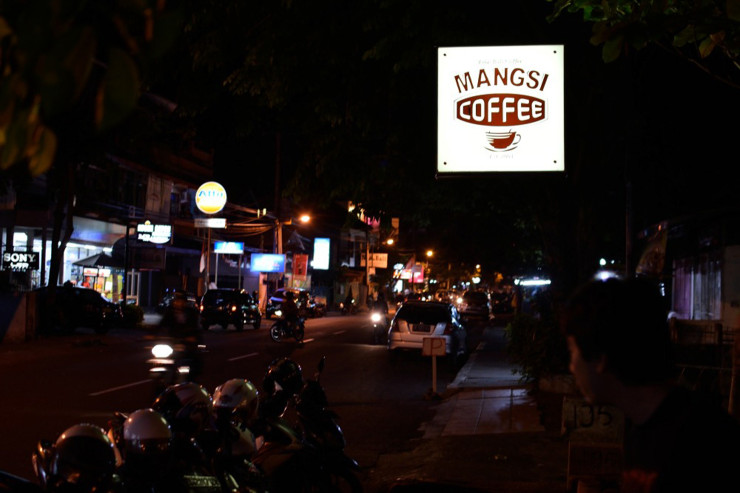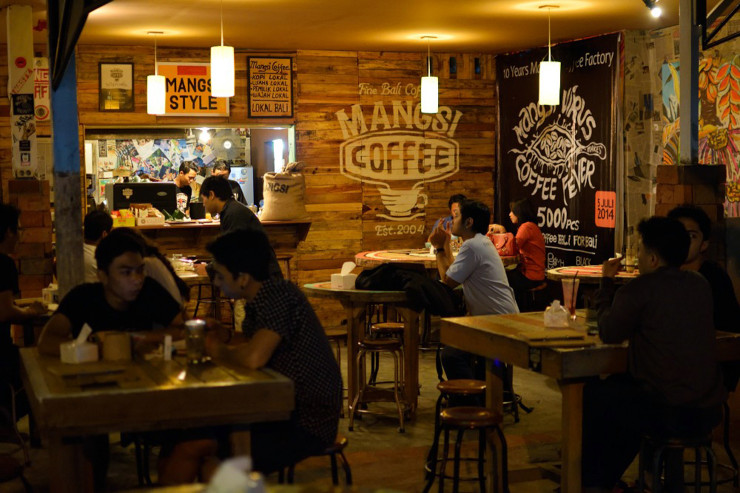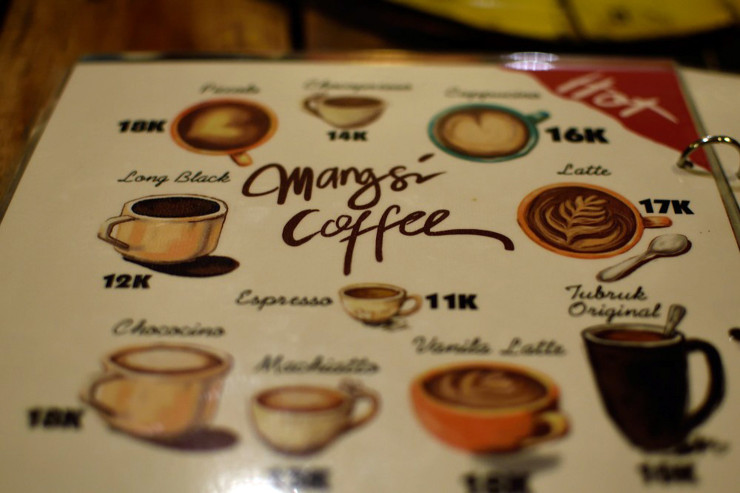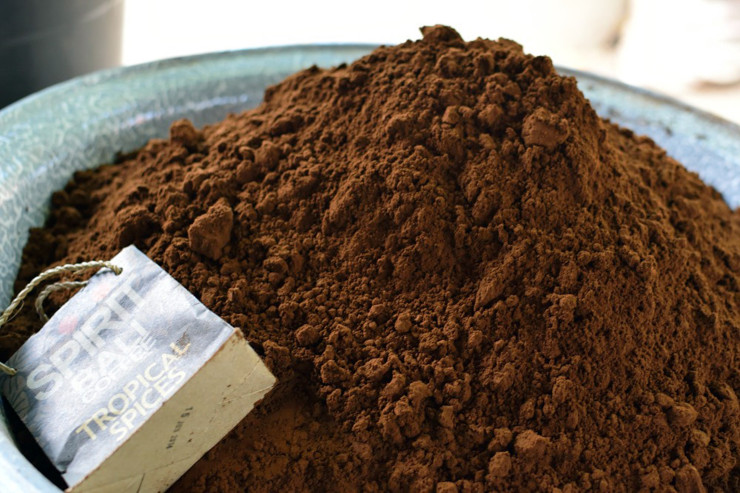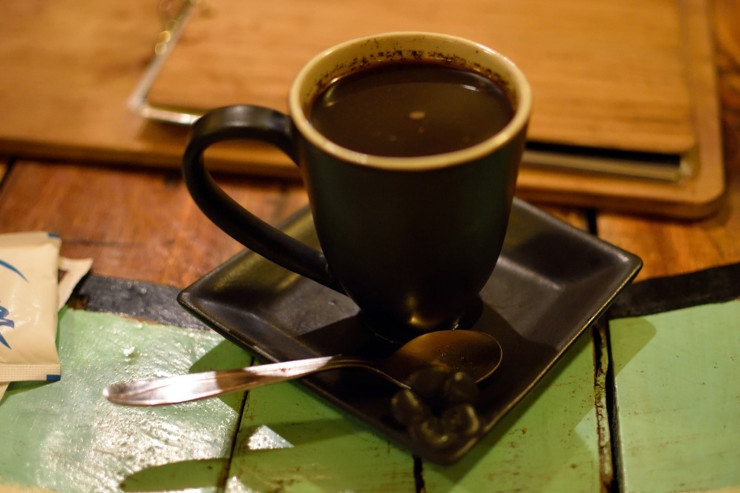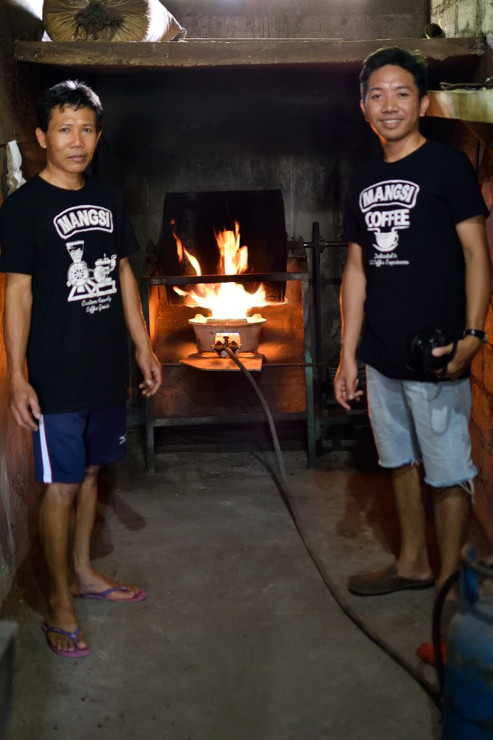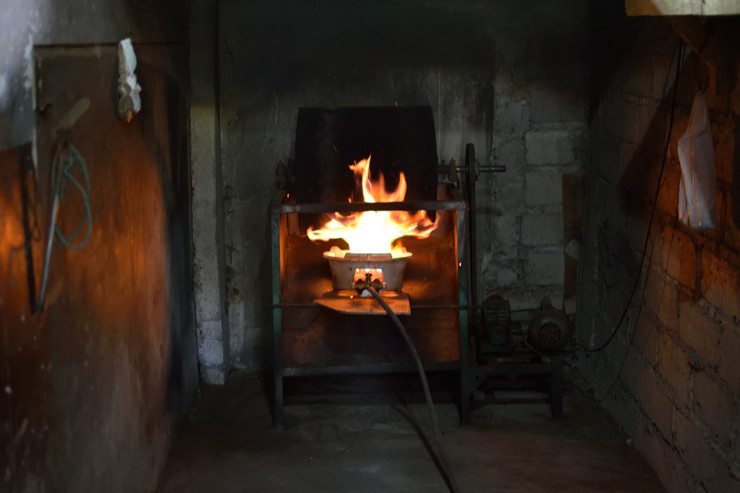Denpasar is a throbbing reef of steel and dust, uneven pavement and unfinished sidewalks—a sooty simulacrum of the coral found offshore. High-beams glare through the faceplate of my helmet as trucks double-pass one another on what most people would deem a two-lane road. I weave my way past the whale of a truck filled with jackfruit, through a teeming school of motorbikes to Mangsi Coffee, an oft-mentioned venue in the capital city of Bali. The buzz of scooters subsides as I enter the hum of the cafe.
Mangsi is open-air, and it is a wonder that the traffic outside doesn’t just come right in and interfere with conversation. Rough-hewn tables and a bar built atop 55-gallon drums allude to the DIY nature of this coffee house. Blues and rock classics humming on the stereo bolster the feeling of being in a roadhouse. It’s a lively scene here, with patrons from many walks of life. Students from nearby ISI (Art Institute of Indonesia) come to talk and smoke kretek clove cigarettes. Younger creative types come for business meetings and dates, and friends of the staff drop by to chat and gossip. Emphatic Indonesian and Balinese peppers the air.
Like most cafes in Indonesia, a menu is provided, and orders are taken tableside. The menu at Mangsi is equally focused on new creations as it is on traditional fare. Phin-filtered coffee, French press, espresso, coffee-based milkshakes, and fresh juice all make a showing. Chances are, there’s something on the menu for even the pickiest.
Tradition is a difficult concept to apply to Indonesia, an archipelago nation comprised of more than 13,000 islands, 238 million people, and 300 distinct ethnic groups. Coffee culture as it relates to tradition is forgivingly less nebulous. The drink of choice here is resolutely kopi tubruk, equal parts sugar and finely ground coffee, often with spices added, stirred together with boiling water and left to settle to the bottom of a small glass. The spice of choice is generally ginger, but ginseng, clove, cardamom, turmeric, and tamarind are not unheard of. At Mangsi, they take pride in the special formulations of spice mixed into the coffee, striving for balance in flavor.
As Mangsi’s I Made Windu Segara Senet (or just Windu for short) explains, coffee has been taken with spices since Dutch colonial times. Though he loves and serves espresso and milk-based drinks, Mangsi is dedicated to Balinese coffee. Spiced signature beverages, all riffs on kopi tubruk, take the forefront. The base for their coffee drinks is coffee produced less than 50 kilometers away, in the Kintamani region of Bali, and all of their coffee is roasted by Windu and his father, I Wayan Marhendra.
From its founding in July 2004 until the present, Mangsi has functioned as a meeting place for many communities. “I have friends from many different places,” says Windu, “my arts community, motorcycle club, coffee community, and medical school community—they all came here when they heard I was opening a cafe and helped spread the word. Without friends, there would be no Mangsi.” Indeed, the cafe recently held a roundtable discussion with locals involved in the coffee trade, including Windu, representatives from the farm in Catur where Mangsi gets its coffee, Arief Budiman of Kopi Kultur, and the Mayor of Denpasar, Ida Bagus Rai Dharmawijaya Mantra.
The meeting places of the past were small coffee stands called kedai kopi; people from different walks of life would meet at these stands and make connections. Kedai kopi have fallen out of favor as of late, and larger cafe chains have taken hold as up-scale meeting grounds that offer a modicum of status to their customers. Franchised mini-markets are an alternative for those less concerned with the status quo. The new cafe culture that Mangsi represents is a welcome respite from the idea of youngsters congregating at convenience stores to drink beer, a prospect reviled by some of the more conservative sections of Indonesian society.
“Mangsi,” directly translated, is the black accretion on the side of the pan exposed to fire. Older generations in Bali would mark the foreheads of children leaving the house with a bit of mangsi as a symbol of Brahma, in order to shield them from negative influences. Windu believes that his cafe and others like it can offer a locally focused, positive place for people to meet outside the home. In this way, Mangsi taps into a cafe tradition that transcends the wider culture in Denpasar, or in Indonesia for that matter. That chatter and buzz you hear bouncing off the walls in Windu’s cafe? It’s the same one you hear in cafes from Melbourne to Helsinki, Seoul to San Francisco. The languages change, but the words stay the same.
Mangsi’s walls echo, but through public discussions with the wider coffee industry (like the one mentioned above), Windu believes he can bring greater recognition to Bali’s coffee scene, its history, and its future. It is with a traditionalist bent that Mangsi rides the swells of change, pulling Denpasar’s burgeoning cafe culture alongside.
Mangsi Coffee is located at Jalan Hayam Wuruk 195, in the Balinese capital city of Denpasar. Follow them on Facebook and Twitter.
This is the first feature for Sprudge by Evan Gilman, a coffee professional currently based in Indonesia.


